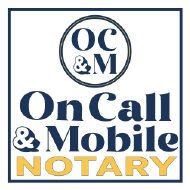
When your documents are heading overseas, it’s crucial to know whether you need an Apostille or an Authentication Certificate. Choosing the wrong one can cause frustrating delays or even rejection by foreign authorities. At On Call & Mobile Notary, we help Wisconsin residents, families, and businesses understand these differences and handle every step with care — so your documents reach their destination quickly and correctly.
What Is an Apostille?
An Apostille is used when your document is being sent to a country that is part of the Hague Apostille Convention of 1961 — an international treaty that simplified how countries recognize each other’s official documents.
Think of it as an international “stamp of approval.” After your document is properly notarized, the Wisconsin Secretary of State issues the Apostille Certificate, verifying that the notary, clerk, or official is legitimate.
Example:
If you’re sending a birth certificate to Spain for dual citizenship, or a marriage certificate to France for visa purposes, those countries accept an Apostille from Wisconsin as official proof.
What Is an Authentication Certificate and When Needed?
If your document is headed to a country not part of the Hague Convention, you’ll need an Authentication Certificate instead. This process involves several layers of approval — typically from your Secretary of State, the U.S. Department of State, and finally, the destination country’s Embassy or Consulate.
Example:
If you’re submitting a financial power of attorney to India corporate documents to Libya, or adoption papers to Palestine, you’ll go through the Authentication & Legalization process — sometimes called Embassy Attestation. It takes longer but ensures your documents are recognized internationally.
Apostille vs Authentication – They’re Not the Same
These two processes are not interchangeable. Sending the wrong type can cause serious setbacks.
Example:
Iran is not a member of the Hague Convention. If you send a Wisconsin Apostille instead of an Authentication Certificate, it will be rejected, forcing you to start over with a clean, newly notarized version.
Understanding which one applies can save you weeks of lost time and unnecessary costs.
The Notary’s Purpose in the Apostille Process
Your Wisconsin Notary Public doesn’t issue the Apostille — their role is to notarize your document correctly so that it can later be certified. Any missing seal, date, or wording error could cause rejection once it reaches the Secretary of State or a foreign court.
Why Choose On Call & Mobile Notary
At On Call & Mobile Notary, we simplify the process from start to finish. Whether you need a Wisconsin Apostille, a Federal Apostille, or an Embassy Legalization, we handle every detail — from notarization to courier delivery — so you don’t have to worry.
We assist with:
- Personal documents: birth, marriage, divorce, power of attorney, and school records
- Business documents: corporate agreements, certificates of good standing, trademarks, and translations
- Multi-country coordination for families and international clients
Our clients appreciate our Same-day Apostille courier service, Expedited 10-day processing, and Standard 20-day mail options — giving you flexibility and peace of mind.
